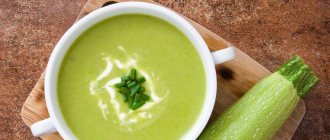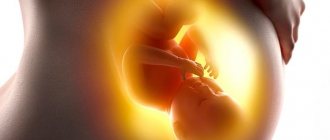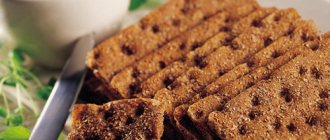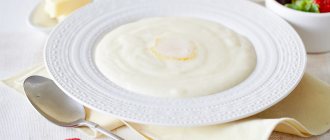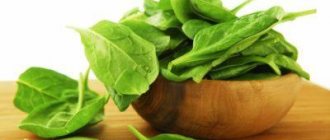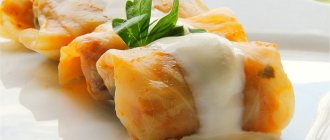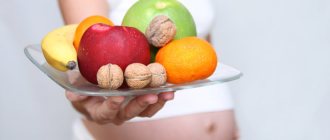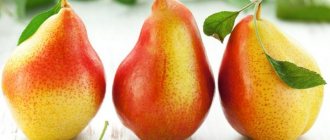About the properties of the fruit
Pear not only has a pleasant, refreshing taste, but also a number of properties that are beneficial to the body:
- iron content will help prevent or eliminate the manifestations of anemia during breastfeeding;
- a large amount of calcium will help maintain normal hair, nails and strengthen the musculoskeletal system;
- the fruit is rich in plant fiber and has laxative properties;
- high water content saturates the body and will be useful during lactation;
- Potassium in the fruit supports the functioning of the heart and vascular system;
- If you are prone to diarrhea, pear will also have a normalizing effect.
Even though they have a bright sweet taste, pears do not contain many calories. There are only 42 kcal per 100 grams of product. Being highly nutritious, such a dessert will not lead to gaining extra pounds and will help fight existing ones.
Dried or baked fruits are as healthy as fresh pears and can also be eaten while breastfeeding. Low allergenicity allows you to often include the fruit during breastfeeding. This product is suitable for nutrition in the first month after the birth of the baby.
Effect of pear on the body
Pear is a healthy and tasty fruit that has a lot of useful elements and vitamins. They not only contribute to the normal development of the baby, but will also help the mother recover faster.
Pears perform a number of useful functions:
- They improve hematopoiesis, which is very important for infants with this problem;
- Stabilizes heart rate, normalizes heart function;
- Has a beneficial effect on the lungs;
- Normalizes digestion, helps with intestinal disorders;
- They have a refreshing and invigorating effect, improve mood;
- Useful for gastritis, heartburn and liver diseases;
- Strengthens blood vessels, especially as a juice.
Pears are sweeter than apples, but contain less sugar and are low in calories. 100 grams contains only 42 kcal. Therefore, a nursing mother does not need to worry about gaining excess weight.
How to choose pears
Can a young mother have a pear? Can. Of course, the best choice would be fruits during their ripening season. However, winter overseas fruits do not contain large amounts of chemicals. Soft, ripe pears are preferred for eating. Such fruits manage to accumulate maximum benefits and have a gentle effect on the digestive tract of nursing mothers.
Basic Rules:
- Purchased fruits must be thoroughly washed to avoid poisoning or infections. This measure applies to all purchased and home-made fruits. Often fruits can be a source of botulism. This is most often found in earthen fruits, but can also be present in pears.
- It is better to prefer green varieties. However, pears with yellowish hues often have a stronger flavor profile. Such fruits have more tender pulp and juiciness.
- At first, it will be healthier for a nursing mother to eat fruits that have undergone heat treatment. Baked pears while breastfeeding a newborn are an excellent dessert for a nursing mother. This dish will not harm the mother’s intestines, but will help the formation of the necessary microflora after childbirth.
- To prevent possible allergies in a newborn for the first time, you need to limit yourself to a small amount and not eat more than 100 grams of pears. The baby's reaction can be unpredictable, and even such a harmless product can cause a lot of problems. Over time, the baby's immune system strengthens, and allergens cease to be dangerous.
Fruits during breastfeeding will provide good support to the mother’s body and help saturate the milk with necessary substances.
How to choose and what to pay attention to?
When choosing pears, you should give preference to green varieties ; the risk of allergies after eating such fruits is minimized. The aroma also says a lot - the bright honey smell indicates that the fruit is simply full of useful substances.
The pear should be ripe, without damage or stains, not too hard and not too soft to the touch. If you have to choose between underripe and overripe, preference should be given to the former, since overripe pears are hard on the stomach. The unripe ones will quickly ripen at home and become edible.
Help: It is better to prepare pear jam and preserves yourself, since store-bought ones are richly flavored with preservatives, flavorings and dyes.
What to cook
Most often, fruits are eaten fresh, but it is better for a young mother to hold off on this in order to avoid colic in the newborn. In this case, pear compote will work well. The dish will help saturate the body with fluid and increase milk production. When feeding your baby, water is especially important to ensure your baby is nourished. During breastfeeding, pears will not only help meet the mother’s needs, but also stimulate lactation.
Many people prepare sweet desserts from fruits. To prepare pear puree, you only need the fruit and a little sugar. Sometimes replacement with fructose is possible. Its use is considered more useful. Even small children can eat such purees at the beginning of complementary feeding.
When choosing ready-made products in stores, preference should be given to products presented in the baby food departments. When purchasing purees for adults, a child may experience an allergic reaction due to the presence of preservatives and flavorings.
Many housewives prepare all kinds of desserts from baked pears. This dish does not lose its beneficial properties and helps improve the nutrition of a young mother. Other additives significantly improve the taste and help enrich the vitamin composition of the finished dessert.
If a pregnant woman has eaten pears, the likelihood of allergies is reduced. Many foods consumed by a pregnant woman reduce the risk of allergies. However, with abuse, the risk increases. Therefore, you should not overdo it with fruits, including pears.
Feedback from nursing mothers
it’s not worth it, after three months you eat it, but it’s too early, I just ate it once while Temka was still little, then he suffered for three days...
Sasha
https://www.baby.ru/blogs/post/25165136–10970130/
my pear is strengthened. I'm not eating yet
Maria
https://www.baby.ru/blogs/post/25165136–10970130/
you can even use the pear juice; it affects lactation and, as far as I know, the pear, on the contrary, cleanses, but the apple strengthens
Olga Safari
https://www.baby.ru/blogs/post/25165136–10970130/
ok, I'm eating. The main thing is to cut off the peel, it contains the poison
Nastasya86
https://www.baby.ru/blogs/post/25165136–10970130/
I started with a pear. There was no allergy, but there was bloating.
Shamatrix
https://www.u-mama.ru/forum/kids/0–1/289581/
The child may have gas. try a little, watch the child’s reaction
Svetlana
https://www.baby.ru/blogs/post/24554844–19712339/
Vitamins and minerals
- Essential oils: help strengthen the immune system and help fight colds. Relieve inflammation and prevent the development of depression.
- Organic acids: regulate metabolic processes in the body and have a positive effect on the condition of the human gastrointestinal tract, preventing the development of dysbiosis.
- Ascorbic acid: strengthens the immune system and prevents infections.
- Iron: stimulates hematopoiesis and prevents the development of anemia.
- Potassium: takes an active part in the work of the heart and normalizes blood pressure.
This composition provides the young mother with the necessary substances. Baking or boiling does not reduce their quantity much, but will help them to be better absorbed. Eating fresh vegetables and fruits causes them to be processed quickly. As a result, they quickly leave the gastrointestinal tract, and beneficial substances do not have time to be absorbed.
Product Features: Benefits for Mother and Child
Pear has a pleasant, rich taste. The content of a large number of microelements and vitamins makes it indispensable for mother and child. The pear contains :
- potassium;
- calcium;
- magnesium;
- phosphorus and other trace elements;
- vitamins C, B9, A;
- cellulose.
Scientists have also discovered:
- immunostimulating;
- tonic;
- fixing;
- astringents;
- diuretics;
- painkillers;
- antiseptic properties of the fruit.
The juicy fruits of the pear tree contain tannins, pectin and nitrogenous substances.
Additional benefits of the fruit
These fruits will help your body in the following ways::
- They satisfy the feeling of hunger well due to the cellulose content.
- Increases the body's strength and normalizes digestion.
- B vitamins improve brain function.
- Pathogenic flora in the intestines is destroyed by organic acids.
- Iron prevents the development of anemia and supplies cells with oxygen.
- Copper helps digest proteins and carbohydrates.
- With the help of cobalt, normal functioning of the thyroid gland is maintained.
Attention! Pear is suitable for women who suffer from diabetes, since its sweetness is based on fructose, which does not require additional insulin during processing.
Pear varieties
Thanks to the efforts of breeders and nature itself, there are currently a large number of different varieties. The most common pears in our country are the Conference and Chinese pears. In large cities you can find others. The latter is more juicy, inferior in tenderness to the first.
Often, a baby’s negative reaction is explained not by the presence of allergens in the fruit, but by processing during storage. In many warehouses, fruits are treated with compounds to increase shelf life. Such products must be thoroughly washed before use or the crust must be cut off.
Many foods are allowed for a nursing mother. Studies have shown that the mother's diet has little effect on the occurrence of colic. This process is a natural phenomenon of the formation of microflora and depends little on nutrition.
With age, the baby's intestines adapt to digesting food and the process normalizes. A newborn baby has a very weak digestive system, and there is no intestinal microflora. After about 3 months, this process normalizes and the colic stops.
Feeding a pear will help saturate the body with the necessary elements and supply it with the necessary substances. After all, the development of a child depends on the full composition of milk. Providing a nursing mother with nutrition is the most important condition for lactation.
Pears during breastfeeding in the first month
There is an opinion that during lactation pears should be introduced into the mother’s diet literally from the baby’s first month. This is not true, but only partly. The fact is that the activation of the intestinal microflora, which we mentioned above, is accompanied by one unpleasant effect.
A significant increase in the number of bacteria contributes to the formation of large amounts of gas, which accumulates in the intestines and causes discomfort in the child.
In the first three months of life, children undergo the process of forming their own microflora, which is often associated with the appearance of colic.
By consuming a pear at such a moment, you seem to add activity to the bacteria in the baby’s intestines, which makes the colic intensify and bother the baby much more.
For this reason, during breastfeeding, pear is introduced into the diet after the child reaches three months of age.
Why is it dangerous?
Along with its beneficial properties, pear also has contraindications for consumption . For example, individual intolerance. Also, you should not eat fruits if you have not tried them before or if there is a food allergy (of any kind) in the family.
For 2-3 months after giving birth, you need to be on a hypoallergenic diet, since the baby’s intestines are only populated with beneficial microflora.
You should not eat pears on an empty stomach , as coarse fiber can damage the gastric mucosa. Also, the pear will become a heavy food after meat. And if you drink it with water, you can cause fermentation and increased gas formation.
If your baby has any reaction, give them up for a month or two, then try introducing them into the diet again. Be sure to consult a doctor so that he can take measures to alleviate the baby’s condition.
Symptoms for which you should see a doctor:
- colic;
- flatulence;
- problems with stool;
- allergic reactions.

